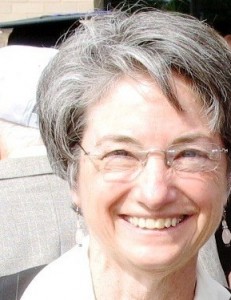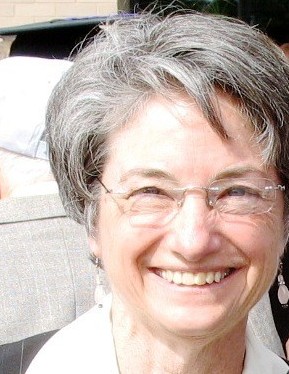Lessons from Detroit: the Other America – Gloria Albrecht
 Twenty-two years ago my U-Haul van and I, a new Ph.D., arrived in Detroit. I came to teach Christian ethics. What I didn’t know was that I didn’t know what I didn’t know. Detroit would teach what neither my life nor advanced degree could. The process of house-hunting was an early clue. Real estate agents assumed that I would not want to live in the city. Above 8 Mile Road, they said. Better yet, above 696. It was a matter of economics, they said, of property values. Putting your money where it would be safe. Body language, loud but unspoken, said, “surely someone like me wouldn’t want to live there.”
Twenty-two years ago my U-Haul van and I, a new Ph.D., arrived in Detroit. I came to teach Christian ethics. What I didn’t know was that I didn’t know what I didn’t know. Detroit would teach what neither my life nor advanced degree could. The process of house-hunting was an early clue. Real estate agents assumed that I would not want to live in the city. Above 8 Mile Road, they said. Better yet, above 696. It was a matter of economics, they said, of property values. Putting your money where it would be safe. Body language, loud but unspoken, said, “surely someone like me wouldn’t want to live there.”
But there I was.
I wish I could claim this act of buying a house in Detroit as a weighty ethical choice. But the truth is I was simply buying an affordable house close to work. Nothing in my experience suggested that this was unusual. It never occurred to me to question my ability to live where I wanted and could afford. But, some said, looking up and down the street, isn’t this a Black neighborhood? Then, aren’t you afraid to come home by yourself? Actually, the question never occurred to me. I had never lived in fear. I didn’t know how privileged I was: Detroit 101.
If I tell you that Detroit taught me about fear, I don’t want you to misunderstand. I am not afraid of Detroit. But in Detroit I have learned to be afraid of the powers and principalities that beat down Detroit over the past 60 years and now are crossing 8 Mile Road, heading north into the suburbs where the rate of poverty is growing faster than in the city – maybe in your suburbs, too. I’m not too surprised. I’ve learned that people are discardable, what Audre Lorde called “permissible victims,” and that there are millions and millions of them and us. Detroit 101.
Just google “Detroit pictures.” You will be shocked at the images that appear – absolute devastation. I still remember my first drive up Grand Blvd in 1992 through neighborhoods of smashed houses and charred ruins. Dresden, I thought. How could a city in the USA look like the scarred remains from incendiary bombs?
Asthma is less visible, but more deadly, leaving children and adults gasping for air around the nation’s largest incinerator, bringing Death to Detroit at twice Michigan’s rate. Schools of unlearning unteach Detroit’s children who then score at historic lows on the Nation’s Report Card. Death visits Detroit infants at twice the rate of Michigan’s; poverty embraces 50% of those who survive to childhood. My colleague, Dr. Jane Schaberg, met Anthony when he was about 4 or 5 years old, locked out of his crack-addicted mother’s house. He began to beg in the neighborhood. Jane writes, “The top of his head would appear at my door’s window day and night and a small voice asks, ‘Is it time for breakfast?’” Then at the age of six or so, Anthony began to walk down 17th Street with a noose around his neck. If anyone bothered to ask, he said he was going to kill himself. Jane writes:
“I think of Jeremiah
wearing the wooden ox yoke,
and then when Hananiah broke that, the iron yoke.
Ko amar Yhwh sebaoth, elohe yisrael
and I think of Isaiah naked and barefoot in the street
….”[1]
Through the eyes of faith, Detroit is the home of a multitude of those whose cries God hears, whose suffering God knows, whose oppression God intends to destroy. But Forbes was not looking through faithful eyes when it named Detroit “America’s Most Miserable City:” most segregated, most poor, where misery abounds for too many. How did this happen in the richest nation in the world?
Google “Detroit Riot” and you will be given the answer you are intended to know: gunshots, tanks, and tear gas on the streets of Detroit, 1967. We “know” that after that riot, white people left Detroit for the safety of the suburbs as the Arsenal of Democracy gradually crumbled under incompetent, even corrupt, (black) leadership. But in Detroit there are forbidden memories: memories that reveal what should be forgotten, memories that challenge our innocence. Detroit 101
So, Detroit is a city of two tales. Let me tell you another story. It recalls different things, centers different people. It begins as a well-known story of hope: People flocking to Detroit at the beginning of the 20th century to fill the factories, fire the furnaces, shape the metal, and forge the cars for Ford, General Motors, and Studebaker. It was hard, back-breaking work that broke men down by the time they were in their forties. But it was also work that paid many a living wage, even the lucky black workers Ford hired. So men, black and white, brought their families north.
It is also a forbidden memory of struggle: struggle for workers’ rights and racial justice. It includes economic Depression: thousands laid off; the 1932 “Ford Hunger Strike March” and the Ford Massacre (4 workers (later a 5th) killed by Ford gun fire, 60 injured). It includes racism: hundreds of white riots at the hiring of black workers and at the sight of black families down the block. Everybody scrambling for scarce good jobs and decent housing. Peace in Europe did not bring peace in America. Postwar prosperity for some left many “others” in despair: the permissible victims. Detroit 101.
In Detroit, a perfect storm of Federal highway expansion to decentralize U.S. industry met corporate business goals of cheaper taxes, lower wages, and weaker unions, creating an exodus of the automobile industry and its jobs to open areas beyond the city. With the G.I. Bill of Rights and F.H.A. redlining policies, white workers followed those jobs to create the new white, middle-class suburbs. It made economic sense. By 1960, Detroit had lost half of its manufacturing jobs and a half million people. Award winning historian Thomas Sugrue describes 1960 Detroit:
“Only fifteen years after WWII, Detroit’s landscape was dominated by rotting hulks of factory buildings, closed and abandoned, surrounded by blocks of boarded-up stores and restaurants. …shells of burned-out and empty buildings, lying among rubbish-strewn vacant lots.”[2]
Residential and occupational segregation left behind black workers, and less skilled white workers, in a city being abandoned economically. Unable to sell their homes, unable to follow the jobs, black families are stuck in a downward economic spiral: discardable. As human need grew in Detroit, white people and white churches moved to suburban prosperity. It made economic sense. Detroit: 101.
Ignorance of the systemic nature of poverty and racism, ignorance of the corresponding systemic privileges that enabled the lives of folk like me, sustains false innocence and false hope. Across America, cities and suburbs are struggling with growing poverty and falling middle-class purchasing power caused by decades of stagnant wages and shrinking benefits for most workers. Eroding city revenues starve public services, erasing the common good in town after town. What powers and principalities are at work in your city?
Detroit’s forbidden memories confront us with the dark and, yes, deadly side of the normal workings of our economy as it pursues prosperity for some. Forbidden memories confront us with the power of racism, mixed with economic self-interest, to lay this burden heavily and disproportionately on the racialized “Other” – our permissible victims. Detroit: 101.
The Gospel from Detroit: In the midst of unjust suffering, what gospel do we hear? Like the prophet Isaiah, Detroit confronts and confounds the comfortable. I ask myself, what is it about the theology of the privileged that enables us to not know Jesus among the “least” in our communities? Jesus announced good news to the poor and liberty for the oppressed. We fled, leaving behind soup kitchens and homeless shelters, too little and way too late. What do we flee?
And yet, like the prophet Jeremiah, Detroit proclaims the promise of God’s grace. At poverty level income, unstable work, payday loans and emergency room medical care, asthma attacks, no inhaler, street lights out and abandoned houses next door, Detroit’s faithful come through this day by the grace of God alone. When tragedy abounds, and there are no material resources to turn to, Detroit’s faithful know it has always only been God, through ages of terror, who heard and saw and came down to deliver.
Faith in God amidst unmerited suffering is Detroit’s Gospel, an audacious faith of courageous survival and constant resistance. It invites Christians of privilege, like me, to enter a faithful life of risk and action, undoing the structures of racial and economic injustice sustaining our privilege. Welcome to Detroit 101
The Rev. Gloria H. Albrecht, PhD, teaches courses in social justice at the University of Detroit Mercy and University of Windsor, Canada.
[1] Jane Schaberg, Carolyn Johnson, and Anthony Philips Martin, Da Fam (unpublished memoir, by permission of Carolyn Johnson), 11, 18.
[2] Thomas Sugrue, The Origins of the Urban Crisis: Race and Inequality in Postwar Detroit (Princeton: 1996), 147-148.


Thank you for continuing to speak truth to power Gloria! I now speak from a different place, having relocated to Seattle, a working town not unlike Detroit in some ways but one that is bubbling with prosperity for a significant number. Living in subsidized housing in a 500 sq ft apartment, but my daughter and her spouse are nearby! Recovering from a knee replacement, I am looking forward to being more active in community (and recreationally) soon!
Peace, peace, for we need it in so many ways,
Ellen
Gloria –
Is it recoverable? What can be done?
Dan
Oh, yes! And, remember, Detroit is not the only city in desperate conditions! Many others, large and small, are facing serious financial troubles, concentrated poverty, and racial segregation. ACSWP is bringing a document to the PC(USA) General Assembly this June in Detroit that documents all that. So, what needs to be done ranges from tax policies to labor policies, transportation policies and education policies, churches’ understanding of ministry to Christians’ understanding of “who is my sister/brother.” Dan, we are the only “first world” nation with this level of inequality, this level of poverty and child poverty. The answers are there. But, as M.L. King, Jr., said, “America, you must be born again.”
Gloria